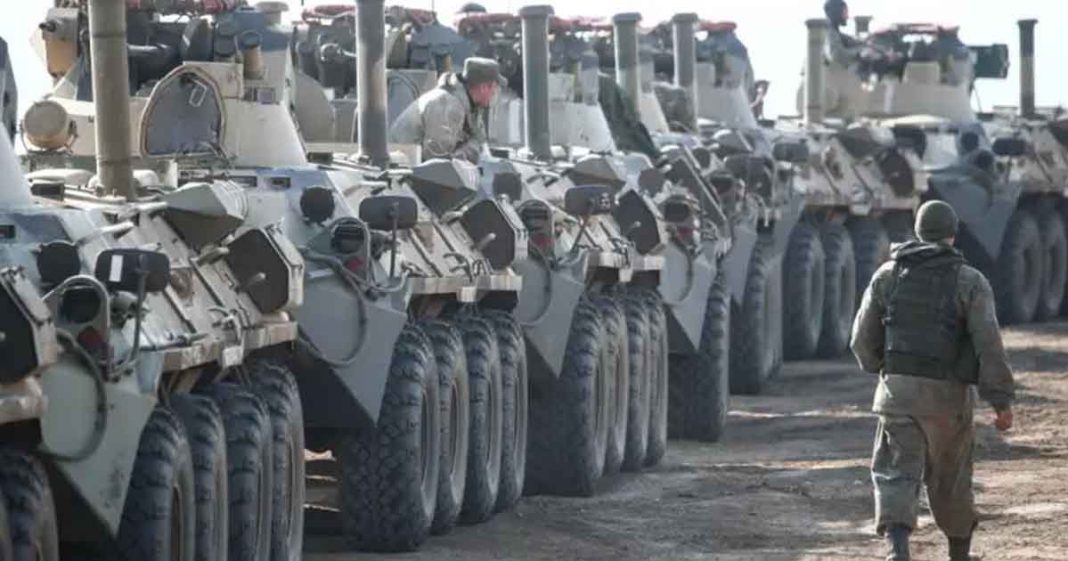In the current era of globalization, interconnectedness and multilateralism, everybody believes in peace, diplomacy and table talks. The ideas such as complex interdependence, regionalism, and economic and political integration have increased the dreams of peaceful co-existence and dialogue. Due to all these attributes and global dynamics, the world is believed to be a global village, having an international regime, monitoring global governance and daily proceedings.
However, the recent Ukraine and Russia tensions have raised some serious questions not only on the power and credibility of the international institutions but on the behavior of regional military and economic alliances and political entities as well. There is a long and detailed history of the Russia and Ukraine conflict, but the recent tensions raised as a result of the deployment of thousands of Russian troops, on the Ukrainian border. After a series of tensions and intensifications in the hostile atmosphere, Russia finally attacked Ukraine from several sides on the 24th of February, and left the latter helpless and on the receiving end. Nevertheless, keeping the root causes of the Russian-Ukrainian conflict aside, one can realize several distinct conclusions of the recent tensions between the two.
Read more: Poland helps 35 Pakistani students stranded in Ukraine
Power politics is the sole basis of international relations
A long time ago, a number of prominent political scholars and realists such as Machiavelli, Thomas Hobbes and Sun Tzu, argued regarding the self-centered, egoistic and power-seeking nature of human beings, especially those who are in power. They emphasized on power and considered it as the only tool to acquire peace, prestige, survival and acknowledgment in the international arena. However, in the post-World Wars era, it is believed that the emergence of several stimulants such as internationalism, economic integration, political engagement and multilateral diplomacy, have brought the world into a civilized, humane and kind-hearted scenario.
The Global institutions like United Nations and its various agencies, EU, ASEAN and SCO and so on, are assumed to play a greater role in resolving the global issues via peaceful means. However, the recent hostilities between Russia and Ukraine have turned out the power politics and military options as a basic and most effective way of pursuing national interests. The actions of Russia show that no matter, how much you pretend yourself like civilized, cooperative and lenient, at the end of the day you never hesitate of using hard power in gaining what you want.
In a nutshell, although, multilateralism may be practiced worldwide, power politics is the sole, real and most capable choice, that a state possesses. There is still a kind of survival of the fittest and it might be right in international politics, when it comes to the state’s survival and desires, despite all these international economic and political institutions.
Moreover, in the 17th century, the peace of Westphalia was conducted to conclude the prolonged war of thirty years, between the Roman Catholics and Protestants in Europe. The treaty along with the other provisions laid down landmark principles for the nation-state system and multilateral diplomacy. Both external and internal sovereignty of the states were considered as the actual and basic right of the latter. Similarly, the current international political system still possesses deep impacts of that treaty, when it comes to the territorial integrity and sovereignty of a state.
However, the recent episodes of tensions in eastern Europe show that it only exists on paper and ground reality is far different from the ideal one. Specifically talking in the context of Ukraine and Russia’s conflict, every state, if acknowledged by the international community as a de jure state, possesses the independence in making choices in the international arena. Ukraine has the right to choose which organization to join and which do not.
International law and norms prohibit Russia to interfere in the internal affairs of any country including Ukraine. It is completely inhumane, immoral and illegal to hold Ukraine punished, for the reason that it tends to become a member of an alliance. But here again, it is stated that no matter what the international law argues, these are only moral norms, and states do what they have to do in order to pursue their best interests.
Read more: Is Belarus going to be the next target in Russian-Ukraine war?
On the other hand, NATO still has the aims and objectives of expansionism. It came into existence in the era of the cold war, in order to contain the Soviet Union expansion in Europe. Now the cold war ended, USSR dissolved, therefore, it is completely irrational to expand their alliance to the backyard of its arch-rival, Russia. Moreover, the contemporary international system discourages the idea of such expansion and imperialism, as it is the era of globalization and liberal democratic values, which stress cooperation, respect, pluralism and sustainable development for all. However, in the 21st globalized century, several words such as the peaceful settlement of disputes, negotiation, co-existence and development for all are very beautiful to be heard and narrated, but at the end of the day the actors do what is best suited to them.
The writer is Islamabad based Columnist, who works as a Research Associate in the International Parliamentarians’ Congress Islamabad. He can be contacted on barkatullahbarakaat@gmail.com. The views expressed in the article are the author’s own and do not necessarily reflect the editorial policy of Global Village Space.














